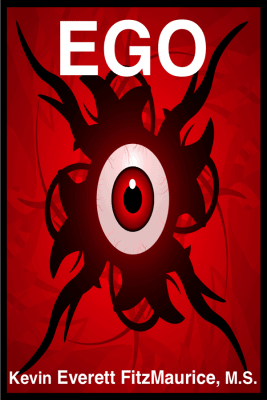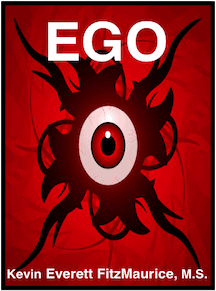“Shoulds” = Pride of Knowing
- Ego will help you to recognize, remove, and replace your ego: a.k.a. self-esteem.
- The ego seeks psychological payoffs and pleasures and uses shoulds, musts, and demands to get them.
“Man delights to ruin man.” —Seneca
“Never say, or think, ‘I am better than whomever.’ That’s what Satan thought.” —Rumi
“Satan thought, ‘I am better than Adam,’ and that better than is still strongly in us.” —Rumi
“To presume that one really knows is fatal indeed!” —Chung Tzu
“Wisdom tends to grow in proportion to one’s awareness of one’s ignorance.” —Anthony de Mello
- Read to overcome your deadly obsession with ego.

“Shoulds” As Laws or Rules
Shoulds go by many names: The ego seeks psychological payoffs
archetypes, beliefs, canons, customs, directives, dogma, ethics, ethos, examples, formulas, guidelines, guides, ideals, laws, manners, methods, models, morals, mores, musts, orders, ordinances, paradigms, precepts, principles, prototypes, recipes, rules, shoulds, standards, tenets, the good, the highest, the law, the right, the universal, values.
Shoulds Used for Pride
- Of course, shoulds do not have to equal pride.
- It is just a fact in adults that shoulds typically indicate pride in adults.
Logical Syllogism
- Superior = pride.
- Shoulds = superior.
- Shoulds = pride.
- Read and discover how CBT, REBT, & Stoicism evolved into one system. The ego seeks psychological payoffs.
How does it work that shoulds become an ego trip?
- The logic works like this:
- A judge is higher than the judged.
- To make sure you are aware of this, the judge’s seat is higher than the judged.
Know Better
- To know the right puts you over the one who does not know the right.
- To know what should-be means you know better than those who do not know what should-be.
Be Better
- Since you are judging, since you know better, since you are shoulding—therefore—you are better, you are superior to those you are judging and shoulding on.
- Since you think you are superior, then you are experiencing pride.
Judge to Be Better
- To should is to judge.
- To judge is to be in a one-up position.
- It is easy to claim to be superior if you are in a one-up position.
- To claim to be superior, even when done automatically or unconsciously, is to experience ego pleasure, high self-esteem, pride.
- Read and discover how CBT, REBT, & Stoicism evolved into one system. The ego seeks psychological payoffs.
Rational Emotive Behavior Therapy (REBT) – The ego seeks psychological payoffs.
- Therefore, an excellent mental health strategy is to reduce and eliminate shoulds.
- This is why Rational Emotive Behavior Therapy (REBT) is so effective. REBT works to eliminate shoulds.
Reduce Shoulds & Reduce Ego
- Even though REBT theory does not generally recognize that shoulds are an ego expression, REBT does reduce ego by reducing shoulds.
- Albert Ellis, the founder or REBT, is aware of this result and wrote a famous paper on it entitled “RET Abolishes Most of the Human Ego” in Psychotherapy: Theory, Research and Practice, 13:4, 343-348, 1976.
Ego Demands Cause Emotional Disturbance
- The dire need to be right can be understood as a coping strategy to avoid being wrong inside.
- People who live by self-esteem a.k.a. ego, have internal conflicts between the should-be and the should-not-be.
- In simple terms, when people think of themselves, they are usually the wrong.
- So people prefer to think of others who they can make wrong so they can be right.
- This explains people’s obsession with the news, which everyone knows is not factual but merely entertainment or propaganda for ego gratification.
- The news distorts information to create the conflict of the shoulds.
- The news wants to present simplistic should-bes and should-not-bes to give your ego food for thought.
- Read and discover how CBT, REBT, & Stoicism evolved into one system. The ego seeks psychological payoffs.
Ego’s favorite two coping strategies are:
“Those who suffer from an exaggerated sense of their own ability and accomplishment are continually subject to frustration, disappointment, and rage when reality intrudes and the world doesn’t validate their idealized view of themselves.” —The Fourteenth Dalai Lama
Games Ego Plays
- To be right, make them wrong.
- To avoid being wrong, make them wrong.
Play to Win Ego
- This game explains why people are externally referented and focused.
- That is, it explains why people are focused on changing and controlling others instead of themselves.
Ego Pain & Ego Pleasure
“Everybody’s main actions are determined by desires which are anterior to the calculations of pleasures and pains.” —Bertrand Russel, History of Western Philosophy
“Victory is pleasant, not only to those who love to conquer, but to all; for there is produced an idea of superiority, which all with more or less eagerness desire.” —Aristotle, Rhetoric
Ego Causes Disturbance
- When you are wrong, you have ego pain, shame, or low self-esteem.
- When you are right, you have ego pleasure, pride, or high self-esteem.
- For peace of mind, give up ego.
- For the sake of your relationships, give up ego.
Deeper than Pride in Knowing Is Suppression
- Suppression is an act of power and pride.
- We derive ego pleasure from exercising the power of the flesh to murder something and then hide it in darkness.
- In order to suppress something, we must first kill it as something, as some label, name, or term.
- Suppression is triple ego pleasure: pleasure in knowing better, pleasure in doing better by suppressing, and pleasure in being better by being suppression’s power (the one who suppresses thinks they are suppression or its power).
Practice the Opposite of Ego Thinking
- The opposite principle of ego is universality: Universality: Way of Peace.
- Read and discover how CBT, REBT, & Stoicism evolved into one system: STPHFR.
Does Honor Exist?
- What Is Real Honor?

- Read and discover how CBT, REBT, & Stoicism evolved into one system: STPHFR.
Quotations Various Sources
Listed Alphabetically
“As for the pleasure in hubris, its cause is this: naive men think that by ill-treating others they make their own superiority the greater.” —Aristotle, Rhetoric
“Identification prevents and perverts the flow of thought-feeling.” —J. Krishnamurti, The Collected Works of J. Krishnamurti, Volume IV, p. 8
“If you must be right, then you fail to learn and so lose.” —Kevin Everett FitzMaurice
“If you’re going to get any joy out of being depressed, you’ve got to stand like this. The worst thing you can do is straighten up and hold your head high because you’ll start to feel better.” —Charlie Brown
“Is not virtue a negation of becoming?” —J. Krishnamurti, The Collected Works of J. Krishnamurti, Vol. III, p. 204
“The cause of all sins in every case lies in the person’s excessive love of self.” —Plato, Laws
“The cause of the pleasure felt by those who insult is the idea that, in ill-treating others, they are more fully showing superiority. That is why the young and the wealthy are given to insults; for they think that, in committing them, they are showing their superiority.” —Aristotle, Rhetoric
“The soul is undiscovered though explored forever to a depth beyond report.” —Heraclitus
“The trouble with most of us is that we would rather be ruined by praise than saved by criticism.” —Norman Vincent Peale
“The way to do is be.” —Lao Tzu
“Unless, of course, you insist on identifying yourself with the people and things you love; and thereby seriously disturb yourself.” —Albert Ellis and Robert A. Harper, A Guide to Rational Living, Third Edition, p. 175
“You can be right and lose, or you can be wrong, learn, and win.” —Kevin Everett FitzMaurice
“You can be right, or you can be happy.” —Anonymous
Quotations from Scripture
“He that findeth his life shall lose it: and he that loseth his life for my sake shall find it.” —Matthew 10:39
“For whosoever will save his life shall lose it: and whosoever will lose his life for my sake shall find it.” —Matthew 16:25
“For whosoever will save his life shall lose it; but whosoever shall lose his life for my sake and the gospel’s, the same shall save it.” —Mark 8:35
“For whosoever will save his life shall lose it: but whosoever will lose his life for my sake, the same shall save it.” —Luke 9:24
“If any man come to me, and hate not his father, and mother, and wife, and children, and brethren, and sisters, yea, and his own life also, he cannot be my disciple.” —Luke 14:26
“Whosoever shall seek to save his life shall lose it; and whosoever shall lose his life shall preserve it.” —Luke 17:34
“He that loveth his life shall lose it; and he that hateth his life in this world shall keep it unto life eternal.” —John 12:25
- Read and discover how CBT, REBT, & Stoicism evolved into one system: STPHFR.
Related Pages of Free Information
- Ego Issues: Five Actions
- Thinking Skills: Know-Better Payoffs
- Unconditional Self-Esteem (USE): Defined
- (USE), (UOE), (ULE) & (UAE): Examples
- (USE), (UOE), (ULE) & (UAE): Reasons
- Read for an innovative seven-step system designed to free you from control by your ego.
- Read and master the life skill of acceptance using the best combination of CBT, REBT, & Stoicism.
6 Groups of Topics Menu
- 1. Pages by Topic
- 2. Fast-Facts by Topic
- 3. Quotations by Topic
- 4. Poems by Topic
- 5. Scripture by Topic
- 6. Websites by Topic
- Read and discover how CBT, REBT, & Stoicism evolved into one system: STPHFR.
- Read for the best breathing exercises for your feelings and stress.
9 Skills & Topics Menu
- 1. Anger Skills & Topics
- 2. Blame Skills & Topics
- 3. Communication Skills & Topics
- 4. Coping Skills & Topics
- 5. Counseling Skills & Topics
- 6. Praying Skills & Topics
- 7. Recovery Skills & Topics
- 8. Responsibility Skills & Topics
- 9. Thinking Skills & Topics
- Read and discover how CBT, REBT, & Stoicism evolved into one system: STPHFR.
- Read for the best breathing exercises for your feelings and stress.



